18 March 2022
Living and learning provides the focus for this week’s Talk Time.
I can describe what to do in different sorts of emergencies.
An emergency situation is when there is an immediate risk that needs to be addressed right away.
We suggest approaching this Talk Time in two parts. First, where and when might you face an emergency? Think of a range of settings and scenarios.
After that, consider what your response would be. If there’s not a trusted adult around, call 999 if possible. The LIONEL acronym below is one that we’d like you to learn. It will help you if you ever need to phone the emergency services.
L – Location – Tell them where the emergency is and where they need to come to.
I – Incident – Tell them what has happened.
O – Other services – Do you need the ambulance, police and fire service?
N – Number of people – How many are involved?
E – Extent of injuries – How badly are they hurt?
L – Location – Repeat again where they need to come to.
Science – microbes
We have been working scientifically in science this half term and also learning about microbes, linked to preventing illness and cleanliness.
We used pepper in a test today to represent microbes. We filled a dish with water. We put a stick in the water. It got wet! We then dipped the stick in a dish filled with water and pepper . The pepper stuck (like microbes do to our hands when we touch anything). Finally, we dipped our stick in a bowl of washing up liquid and water. When we dipped it in the water again, the pepper moved away like magic! There was a gasp from everyone! This shows us that microbes (that sometimes make us ill) do not like soap and that is why we use it to wash our hands.
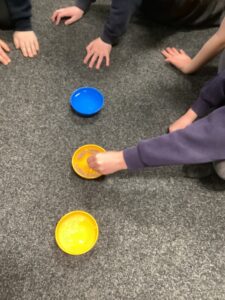
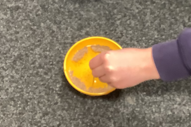

Recorders
Year 3 have been learning to play the recorder with Mrs Bald. Today, they rehearsed playing to the tune of the rhyme ‘Hot Cross Buns.’
The children will be performing at St James’ Church on Thursday 31st March and the service will begin at 2pm. Please join us if you are able to.






Year 5 & 6 ‘rulz’… Yeah, it does!
Our cloakroom has a plethora of compliments, boosts and celebrations of friendship! It’s only March and I think we’re rapidly running out of space!
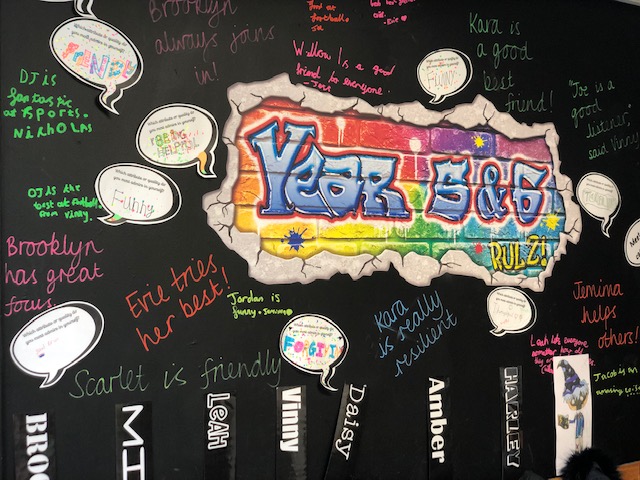
It’s great to see the children being so positive about their classmates.
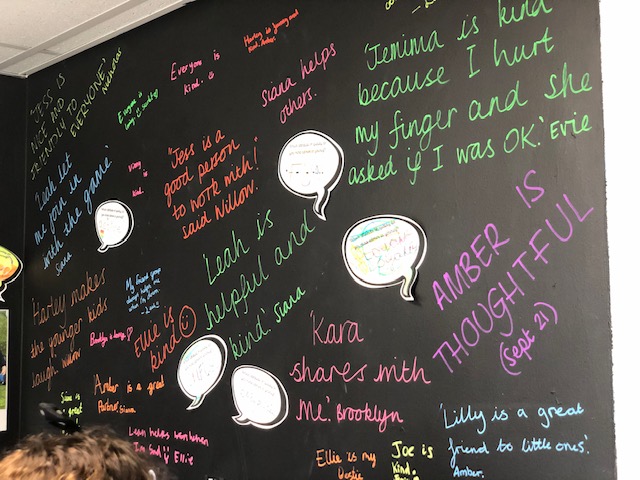
If children catch someone being friendly, kind, helpful or just generally being an all-round top person, they can grab a chalk pen and scribe on our communal cloakroom wall to share that moment with us all! Nice one, Y5/6!
Quick Beats
In today’s music lesson, we’ve explored Quick Beats – it’s an app used to create different styles of drum beats, like grime, hip-hop and Latin.
We mirrored our iPads onto the board so we could share our beats with our classmates – everyone was impressed at how cool our beats sounded!
Nicholas – ‘Scarlet’s beats were wild because it sounds like it’d be played in the jungle!’
Joe – ‘Evie’s beats made me feel like I was at a disco!’
Siana – ‘Jess’ beats were upbeat and energetic.’
The children have been given their log-ins so that they can have a go at accessing Quick Beats at home.
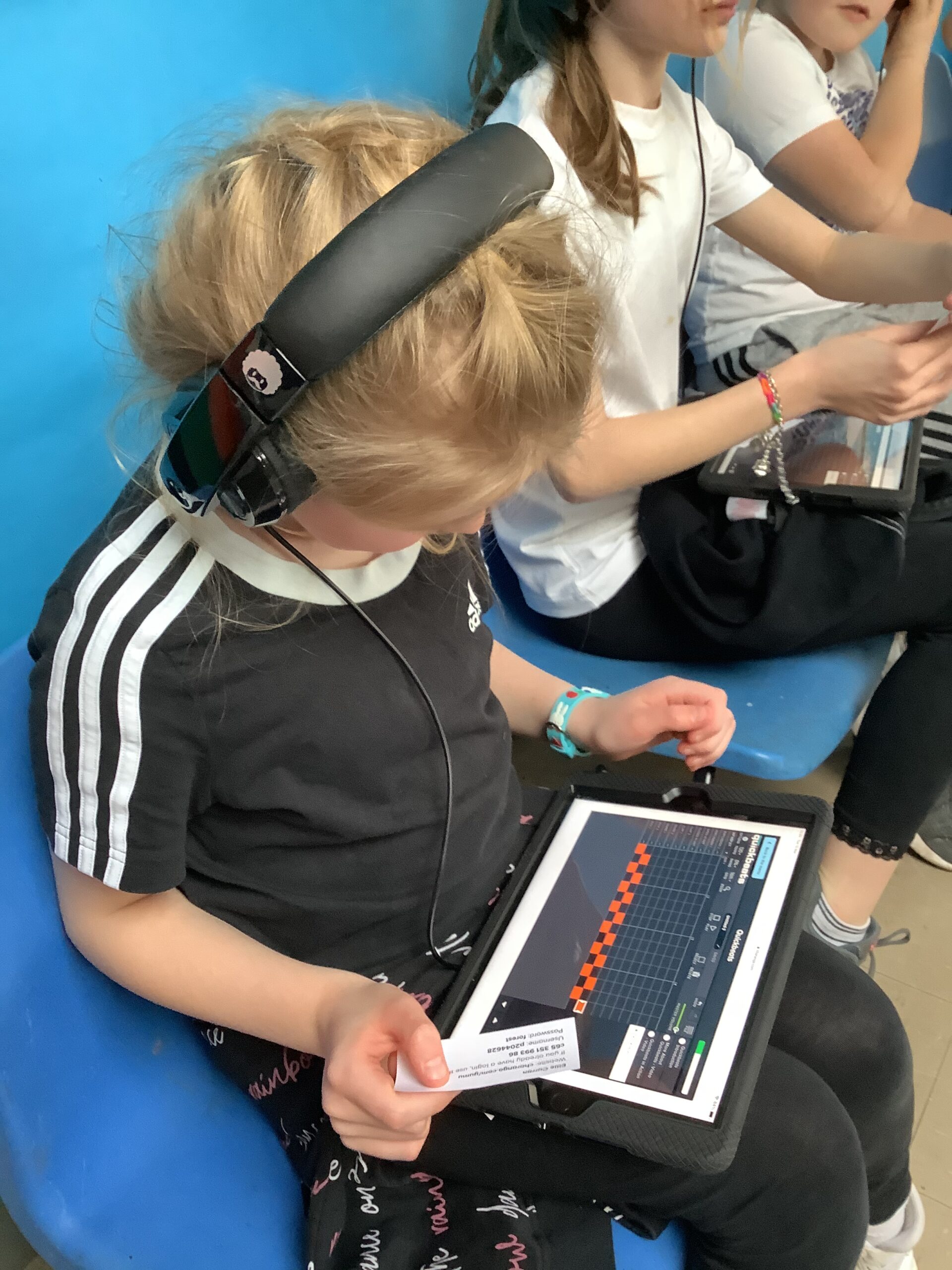
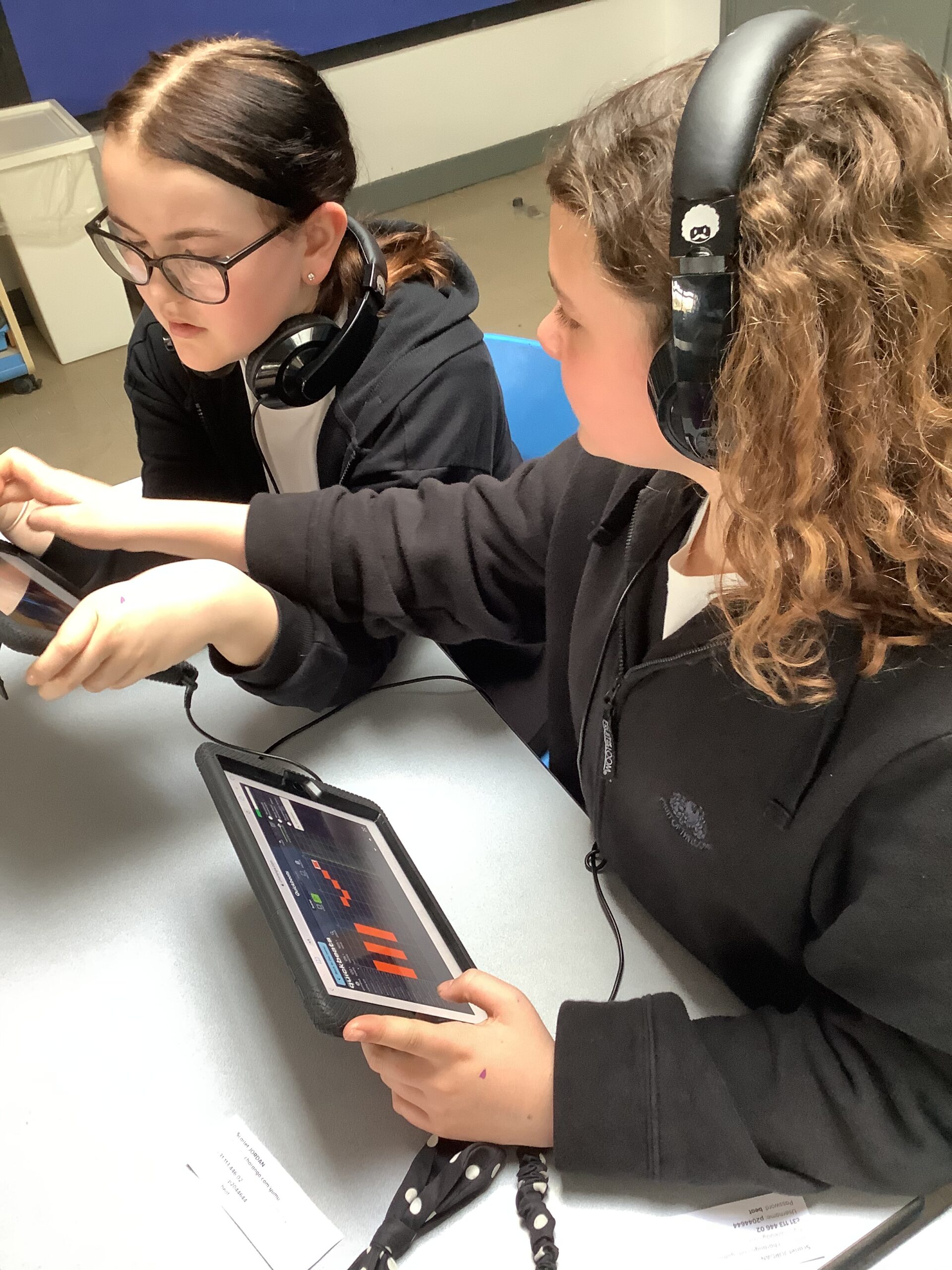
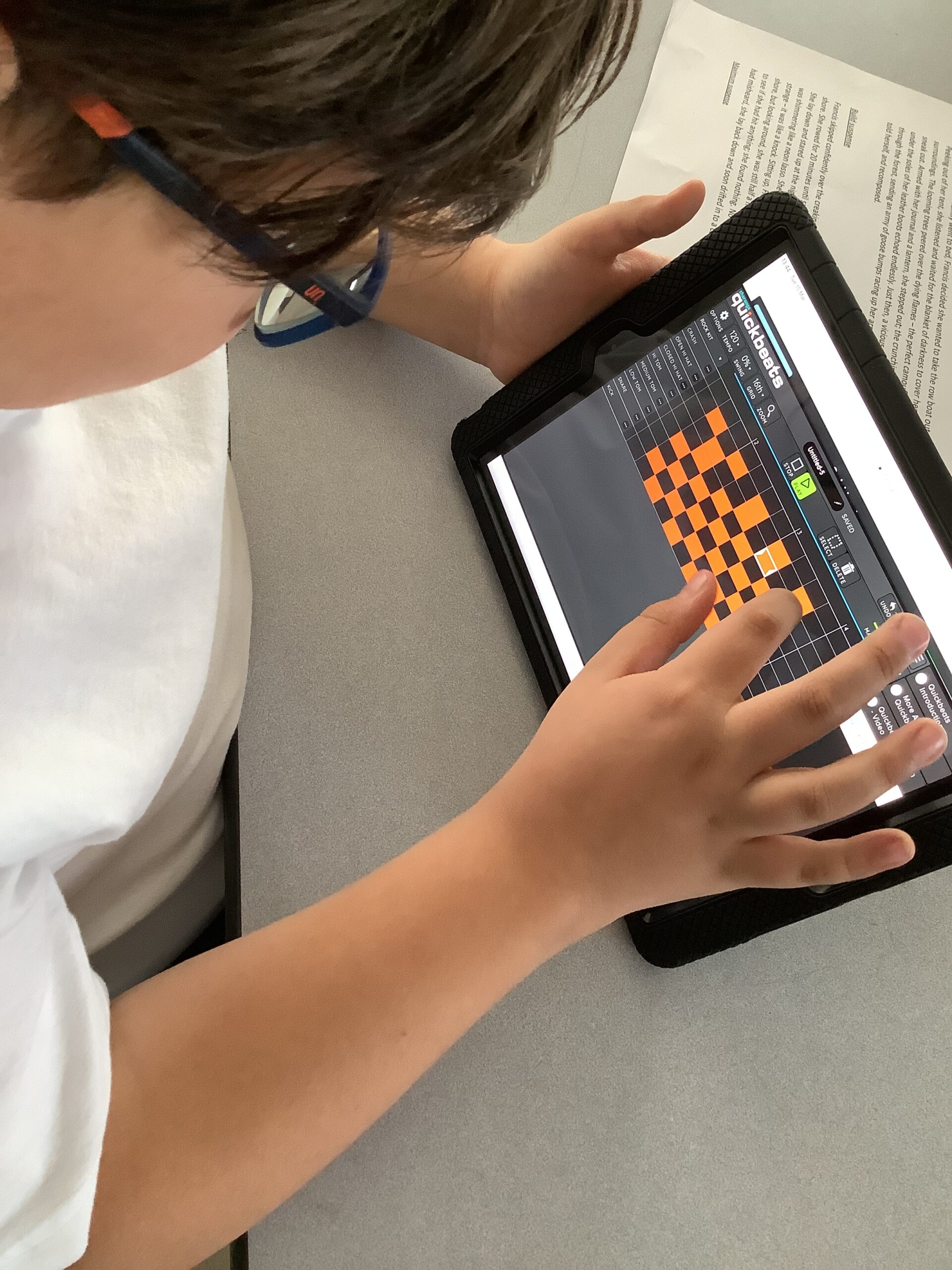
This week’s bible story
The Son Who Left Home: Luke 15:11-32
Jesus told many stories that are recorded in the New Testament. His stories were often about everyday events that all the people could relate to, but they had a special purpose – they were told to help people understand more about God. Usually, the stories, or parables as they are called, spoke for themselves, but sometimes they had to be explained. Let me now tell you one of Jesus’ best-known parables.
Read the story of the son who left home.
Reflection:
Jesus told this story to show how much God loves us. Just like the son in the story, we often want our own way and do not think of the consequences. We make foolish mistakes and come to regret them later. Just like the father in the story, though, God never stops loving us and is always ready to forgive us when we admit our wrongdoing.
Prayer:
Dear Lord,
Forgive us, we pray, for the times when we have acted foolishly.
When we have wanted our own way and not listened to good advice;
when we have not considered the thoughts or feelings of others.
May we be prepared to forgive others when they are sorry for hurting or upsetting us, just as you are prepared to forgive us when we admit our wrongdoing.
Amen.
Week beginning 14 March 2022
Sorry you can’t be in school this week. Here are a range of resources linked to what is happening in class. Don’t forget to get in touch with your class teacher if you need support.
Maths
Follow this sequence of maths learning which is linked to algebra.
Lesson 1: video, worksheet, answers
Lesson 2: video, worksheet, answers
Lesson 3: video, worksheet, answers
Lesson 4: video, worksheet, answers
Lesson 5: video, worksheet, answers
Lesson 6: video, worksheet, answers
Lesson 7: video, worksheet, answers
Lesson 8: video, worksheet, answers
Lesson 9: video, worksheet, answers
Lesson 10: video, worksheet, answers
You don’t have to print the worksheet. Your child can write or draw their answers on paper. Your child’s learning will be most effective if you sit with them to pause the clip and check / praise / support your child as the clip moves on.
Practise times tables on Times Table Rockstars, too. Email the class teacher if you need your child’s login and password details.
(Suggested time: 30 minutes of Maths and 15 minutes of Rockstars daily)
Spelling
Look on the homework page to find this week’s spellings. They should choose some past spellings that they feel less confident with. Your child should complete one task each day.
- Day 1: Generate more words linked to the spelling pattern or ‘rule’. You could look out for the words in the book you’re reading at home, or any other text, like a website linked to our science topic of Living Things and their Habitat.
- Day 2: Practise the spellings using two of the ideas in our Super Spelling Strategies guide. (Set yourself and others at home a challenge of using some of the words when you’re speaking, too!)
- Day 3: Write separate sentences, each containing one of the spellings. (Don’t forget to show off really neat handwriting and make sure you sentence starts with a capital letter and ends with a full stop, exclamation mark (!) or question mark (?).
- Day 4: Repeat Task 2 or 3.
- Day 5: Get an adult at home to test you on your spellings. Practise any you spell incorrectly – you could write them out carefully until you’re sure.
(Suggested time: 15-20 minutes daily)
Reading fluency.
This is the text we’re using in school. It’s some top tips to stay safe online.
In school, we generally follow this sequence:
- Day 1: Read the text aloud with your child listening. Read it clearly and slowly, pointing to each word as you read. Have a chat about any unfamiliar words.
- Day 2: Read aloud each sentence (a full short sentence or part of a longer sentence), and have your child read it back to you. Do this ‘echo reading’ for the whole text.
- Day 3: Read the text and talk about the effect of the punctuation on how you read it – pauses for full stops and expression for exclamations (!) or questions (?). Your child reads the text aloud.
- Day 4: Read together with expression (just like you practised on Day 3).
- Day 5: Your child reads independently and fluently.
(Suggested time: 15 minutes daily)
Reading comprehension
We’ll be using this RIC text in class to practise comprehension skills. RIC stands for:
- Retrieve: finding information in a text
- Interpret: using clues in the text to unlock information
- Choice: thinking about the author’s choice of words, techniques or organisation that make the text interesting and enjoyable to read
This half term we’ll be reading a range of fiction and non-fiction texts about computing and online safety. Here’s a series of lessons based on A Career in Computer Games by Anthony Horowitz. There’s a whole series of lessons, but start at Lesson 1 and work through, doing one (or maybe even two) each day. If you’re self-isolating in your second week, try these poetry lessons on The British by Benjamin Zephaniah (Suggested time: 30 minutes daily)
Writing
In writing, be learning how to write a set of instructions for a computer game. Follow these lessons on instructional writing. There’s a whole series of lessons, but start at Lesson 1 and work through, doing one (or maybe even two) each day. (If you’re self-isolating in your second week, stick with the series of lessons you’ve already started and aim to complete the full series.)
(Suggested time: 30-40 minutes for each)
Topic
Our topic this half-term is computing.
Follow these lessons on selection in quizzes from Oak Academy. Follow the lesson sequence. It has 6 lessons so you could do three a week.
(Suggested time: 30-40 minutes)
Science
Last half term our topic was evolution.
These six lessons from Oak National Academy link closely to what we’ve been doing in class last half term. Start at Lesson 1 and work through, doing two or three in the week. If you’ve previously completed one of these lessons, have a go at the ones you haven’t completed yet.
If Science really motivates your child, you could also use look at these lessons all about practical Science.
(Suggested time: 30-45 minutes)
PE
Don’t forget to do some daily exercise!
Do two or three of these Five Minute Moves from Joe Wicks each day – spread them across the day as if they were playtimes, maybe!
Try working through this series of 25 lessons from the Association for Physical Education – do two or three in the week.
(Suggested time: 5 minutes daily, plus 30 minutes for the longer PE lessons)
Extra stuff…
As an extra (or as an alternative, if this helps to motivate your child)…
Geography isn’t a topic-driver this half-term, but you could brush up on your locational knowledge – something that was missed when schools closed earlier this year. You could explore some online maps and try to memorise some new countries, capitals, rivers and mountain ranges. These three lessons about Europe are worth checking out.
What about some Living and Learning? While you’re away from school, you could check out these lessons on money!
Week beginning 14 March 2022
Sorry you can’t be in school this week. Here are a range of resources linked to what is happening in class. Don’t forget to get in touch with your class teacher if you need support.
Maths
Follow this sequence of maths learning which is linked to fractions.
Lesson 1: video, worksheet, answers
Lesson 2: video, worksheet, answers
Lesson 3: video, worksheet, answers
Lesson 4: video, worksheet, answers
Lesson 5: video, worksheet, answers
Lesson 6: video, worksheet, answers
Lesson 7: video, worksheet, answers
Lesson 8: video, worksheet, answers
Lesson 9: video, worksheet, answers
Lesson 10: video, worksheet, answers
You don’t have to print the worksheet. Your child can write or draw their answers on paper. Your child’s learning will be most effective if you sit with them to pause the clip and check / praise / support your child as the clip moves on.
Practise times tables on Times Table Rockstars, too. Email the class teacher if you need your child’s login and password details.
(Suggested time: 30 minutes of Maths and 15 minutes of Rockstars daily)
Spelling
Look on the homework page to find this week’s spellings. They should choose some past spellings that they feel less confident with. Your child should complete one task each day.
- Day 1: Generate more words linked to the spelling pattern or ‘rule’. You could look out for the words in the book you’re reading at home, or any other text, like a website linked to our science topic of Living Things and their Habitat.
- Day 2: Practise the spellings using two of the ideas in our Super Spelling Strategies guide. (Set yourself and others at home a challenge of using some of the words when you’re speaking, too!)
- Day 3: Write separate sentences, each containing one of the spellings. (Don’t forget to show off really neat handwriting and make sure you sentence starts with a capital letter and ends with a full stop, exclamation mark (!) or question mark (?).
- Day 4: Repeat Task 2 or 3.
- Day 5: Get an adult at home to test you on your spellings. Practise any you spell incorrectly – you could write them out carefully until you’re sure.
(Suggested time: 15-20 minutes daily)
Reading fluency.
This is the text we’re using in school. It’s some top tips to stay safe online.
In school, we generally follow this sequence:
- Day 1: Read the text aloud with your child listening. Read it clearly and slowly, pointing to each word as you read. Have a chat about any unfamiliar words.
- Day 2: Read aloud each sentence (a full short sentence or part of a longer sentence), and have your child read it back to you. Do this ‘echo reading’ for the whole text.
- Day 3: Read the text and talk about the effect of the punctuation on how you read it – pauses for full stops and expression for exclamations (!) or questions (?). Your child reads the text aloud.
- Day 4: Read together with expression (just like you practised on Day 3).
- Day 5: Your child reads independently and fluently.
(Suggested time: 15 minutes daily)
Reading comprehension
We’ll be using this RIC text in class to practise comprehension skills. RIC stands for:
- Retrieve: finding information in a text
- Interpret: using clues in the text to unlock information
- Choice: thinking about the author’s choice of words, techniques or organisation that make the text interesting and enjoyable to read
This half term we’ll be reading a range of fiction and non-fiction texts about computing and online safety. Here’s a series of lessons based on A Career in Computer Games by Anthony Horowitz. There’s a whole series of lessons, but start at Lesson 1 and work through, doing one (or maybe even two) each day. If you’re self-isolating in your second week, try these poetry lessons on The British by Benjamin Zephaniah (Suggested time: 30 minutes daily)
Writing
In writing, be learning how to write a set of instructions for a computer game. Follow these lessons on instructional writing. There’s a whole series of lessons, but start at Lesson 1 and work through, doing one (or maybe even two) each day. (If you’re self-isolating in your second week, stick with the series of lessons you’ve already started and aim to complete the full series.)
(Suggested time: 30-40 minutes for each)
Topic
Our topic this half-term is computing.
Follow these lessons on selection in quizzes from Oak Academy. Follow the lesson sequence. It has 6 lessons so you could do three a week.
(Suggested time: 30-40 minutes)
Science
Last half term our topic was evolution.
These six lessons from Oak National Academy link closely to what we’ve been doing in class last half term. Start at Lesson 1 and work through, doing two or three in the week. If you’ve previously completed one of these lessons, have a go at the ones you haven’t completed yet.
If Science really motivates your child, you could also use look at these lessons all about practical Science.
(Suggested time: 30-45 minutes)
PE
Don’t forget to do some daily exercise!
Do two or three of these Five Minute Moves from Joe Wicks each day – spread them across the day as if they were playtimes, maybe!
Try working through this series of 25 lessons from the Association for Physical Education – do two or three in the week.
(Suggested time: 5 minutes daily, plus 30 minutes for the longer PE lessons)
Extra stuff…
As an extra (or as an alternative, if this helps to motivate your child)…
Geography isn’t a topic-driver this half-term, but you could brush up on your locational knowledge – something that was missed when schools closed earlier this year. You could explore some online maps and try to memorise some new countries, capitals, rivers and mountain ranges. These three lessons about Europe are worth checking out.
What about some Living and Learning? While you’re away from school, you could check out these lessons on money!
Week beginning 14 March 2022
Hi everyone
We hope you’re feeling happy and healthy at home. We miss having you in school but we want you to know that you’re still very much part of our school community. Enjoy your home learning for this week.
Maths
Follow this sequence of maths learning which is linked to fractions.
- Lesson 1: video, worksheet, answers
- Lesson 2: video, worksheet, answers
- Lesson 3: video, worksheet, answers
- Lesson 4: video, worksheet, answers
- Lesson 5: video, worksheet, answers
- Lesson 6: video, worksheet, answers
- Lesson 7: video, worksheet, answers
- Lesson 8: video, worksheet, answers
- Lesson 9: video, worksheet, answers
- Lesson 10: video, worksheet, answers
You don’t have to print the worksheet. Your child can write or draw their answers on paper. Your child’s learning will be most effective if you sit with them to pause the clip and check / praise / support your child as the clip moves on.
Practise times tables on Times Table Rockstars, too. If your child is in Y3, we’re concentrating on the 8 times table. If your child is in Y4, we’re concentrating on all times tables up to and including 12 x 12. Email the class teacher if you need your child’s login and password details.
(Suggested time: 30 minutes of Maths and 15 minutes of Rockstars daily)
Spelling
Look on the homework page to find this week’s spellings. They should choose some past spellings that they feel less confident with. Your child should complete one task each day.
- Day 1: Generate more words linked to the spelling pattern or ‘rule’. You could look out for the words in the book you’re reading at home, or any other text, like a website linked to our science topic of Living Things and their Habitat.
- Day 2: Practise the spellings using two of the ideas in our Super Spelling Strategies guide. (Set yourself and others at home a challenge of using some of the words when you’re speaking, too!)
- Day 3: Write separate sentences, each containing one of the spellings. (Don’t forget to show off really neat handwriting and make sure you sentence starts with a capital letter and ends with a full stop, exclamation mark (!) or question mark (?).
- Day 4: Repeat Task 2 or 3.
- Day 5: Get an adult at home to test you on your spellings. Practise any you spell incorrectly – you could write them out carefully until you’re sure.
(Suggested time: 15-20 minutes daily)
Reading fluency
This is the text we’re using in class this week to build up fluency skills.
In school, we generally follow this sequence:
- Day 1: Read the text aloud with your child listening. Read it clearly and slowly, pointing to each word as you read. Have a chat about any unfamiliar words.
- Day 2: Read aloud each sentence (a full short sentence or part of a longer sentence), and have your child read it back to you. Do this ‘echo reading’ for the whole text.
- Day 3: Read the text and talk about the effect of the punctuation on how you read it – pauses for full stops and expression for exclamations (!) or questions (?). Your child reads the text aloud.
- Day 4: Read together with expression (just like you practised on Day 3).
- Day 5: Your child reads independently and fluently.
(Suggested time: 15 minutes daily)
Reading comprehension
We’ll be using this RIC text in class to practise comprehension skills. RIC stands for:
- Retrieve: finding information in a text
- Interpret: using clues in the text to unlock information
- Choice: thinking about the author’s choice of words, techniques or organisation that make the text interesting and enjoyable to read
Follow these lessons from Oak National Academy. There’s a whole series of lessons, but start at Lesson 1 and work through, doing one (or maybe even two) each day. (If you’re self-isolating in your second week, stick with the series of lessons you’ve already started and aim to complete the full series.)
(Suggested time: 30 minutes daily)
Writing
Follow these lessons from Oak National Academy. There’s a whole series of lessons, but start at Lesson 1 and work through, doing one (or maybe even two) each day. (If you’re self-isolating in your second week, stick with the series of lessons you’ve already started and aim to complete the full series.)
(Suggested time: 30-40 minutes for each)
Topic
Our topic this half-term is about computing.
Follow these lessons from Oak National Academy. There’s a whole series of lessons, but start at Lesson 1 and work through, doing one (or maybe even two) each day. (If you’re self-isolating in your second week, stick with the series of lessons you’ve already started and aim to complete the full series.)
(Suggested time: 30-40 minutes)
Science
Our focus this half-term is about working scientifically.
These six lessons from Oak National Academy link closely to what we’ve been doing in class. Start at Lesson 1 and work through, doing two or three in the week. If you’ve previously completed on of these lessons, have a go at the ones you haven’t completed yet.
If Science really motivates your child, you could also use look at these lessons all about practical Science.
(Suggested time: 30-45 minutes)
PE
Don’t forget to do some daily exercise!
Do two or three of these Five Minute Moves from Joe Wicks each day – spread them across the day as if they were playtimes, maybe!
Try working through this series of 25 lessons from the Association for Physical Education – do two or three in the week.
(Suggested time: 5 minutes daily, plus 30 minutes for the longer PE lessons)
Extra stuff…
As an extra (or as an alternative, if this helps to motivate your child)…
Fancy learning about a new religion? You don’t have to be religious to learn about, and appreciate, religions from all around the world. Check out this set of lessons from Oak National Academy – you could choose to focus on one religion or dip into each set for an overview.
What about some Living and Learning? While you’re away from school, you could check out these lessons on keeping safe!
Week beginning 14 March 2022
Hi everyone
We hope you’re feeling happy and healthy at home. We miss having you in school but we want you to know that you’re still very much part of our school community. Enjoy your home learning for this week.
Maths
Follow this sequence of maths learning which is linked to fractions.
- Lesson 1: video, worksheet, answers
- Lesson 2: video, worksheet, answers
- Lesson 3: video, worksheet, answers
- Lesson 4: video, worksheet, answers
- Lesson 5: video, worksheet, answers
- Lesson 6: video, worksheet, answers
- Lesson 7: video, worksheet, answers
- Lesson 8: video, worksheet, answers
- Lesson 9: video, worksheet, answers
- Lesson 10: video, worksheet, answers
You don’t have to print the worksheet. Your child can write or draw their answers on paper. Your child’s learning will be most effective if you sit with them to pause the clip and check / praise / support your child as the clip moves on.
Practise times tables on Times Table Rockstars, too. If your child is in Y3, we’re concentrating on the 8 times table. If your child is in Y4, we’re concentrating on all times tables up to and including 12 x 12. Email the class teacher if you need your child’s login and password details.
(Suggested time: 30 minutes of Maths and 15 minutes of Rockstars daily)
Spelling
Look on the homework page to find this week’s spellings. They should choose some past spellings that they feel less confident with. Your child should complete one task each day.
- Day 1: Generate more words linked to the spelling pattern or ‘rule’. You could look out for the words in the book you’re reading at home, or any other text, like a website linked to our science topic of Living Things and their Habitat.
- Day 2: Practise the spellings using two of the ideas in our Super Spelling Strategies guide. (Set yourself and others at home a challenge of using some of the words when you’re speaking, too!)
- Day 3: Write separate sentences, each containing one of the spellings. (Don’t forget to show off really neat handwriting and make sure you sentence starts with a capital letter and ends with a full stop, exclamation mark (!) or question mark (?).
- Day 4: Repeat Task 2 or 3.
- Day 5: Get an adult at home to test you on your spellings. Practise any you spell incorrectly – you could write them out carefully until you’re sure.
(Suggested time: 15-20 minutes daily)
Reading fluency
This is the text we’re using in class this week to build up fluency skills.
In school, we generally follow this sequence:
- Day 1: Read the text aloud with your child listening. Read it clearly and slowly, pointing to each word as you read. Have a chat about any unfamiliar words.
- Day 2: Read aloud each sentence (a full short sentence or part of a longer sentence), and have your child read it back to you. Do this ‘echo reading’ for the whole text.
- Day 3: Read the text and talk about the effect of the punctuation on how you read it – pauses for full stops and expression for exclamations (!) or questions (?). Your child reads the text aloud.
- Day 4: Read together with expression (just like you practised on Day 3).
- Day 5: Your child reads independently and fluently.
(Suggested time: 15 minutes daily)
Reading comprehension
We’ll be using this RIC text in class to practise comprehension skills. RIC stands for:
- Retrieve: finding information in a text
- Interpret: using clues in the text to unlock information
- Choice: thinking about the author’s choice of words, techniques or organisation that make the text interesting and enjoyable to read
Follow these lessons from Oak National Academy. There’s a whole series of lessons, but start at Lesson 1 and work through, doing one (or maybe even two) each day. (If you’re self-isolating in your second week, stick with the series of lessons you’ve already started and aim to complete the full series.)
(Suggested time: 30 minutes daily)
Writing
Follow these lessons from Oak National Academy. There’s a whole series of lessons, but start at Lesson 1 and work through, doing one (or maybe even two) each day. (If you’re self-isolating in your second week, stick with the series of lessons you’ve already started and aim to complete the full series.)
(Suggested time: 30-40 minutes for each)
Topic
Our topic this half-term is about computing.
Follow these lessons from Oak National Academy. There’s a whole series of lessons, but start at Lesson 1 and work through, doing one (or maybe even two) each day. (If you’re self-isolating in your second week, stick with the series of lessons you’ve already started and aim to complete the full series.)
(Suggested time: 30-40 minutes)
Science
Our focus this half-term is about working scientifically.
These six lessons from Oak National Academy link closely to what we’ve been doing in class. Start at Lesson 1 and work through, doing two or three in the week. If you’ve previously completed on of these lessons, have a go at the ones you haven’t completed yet.
If Science really motivates your child, you could also use look at these lessons all about practical Science.
(Suggested time: 30-45 minutes)
PE
Don’t forget to do some daily exercise!
Do two or three of these Five Minute Moves from Joe Wicks each day – spread them across the day as if they were playtimes, maybe!
Try working through this series of 25 lessons from the Association for Physical Education – do two or three in the week.
(Suggested time: 5 minutes daily, plus 30 minutes for the longer PE lessons)
Extra stuff…
As an extra (or as an alternative, if this helps to motivate your child)…
Fancy learning about a new religion? You don’t have to be religious to learn about, and appreciate, religions from all around the world. Check out this set of lessons from Oak National Academy – you could choose to focus on one religion or dip into each set for an overview.
What about some Living and Learning? While you’re away from school, you could check out these lessons on keeping safe!